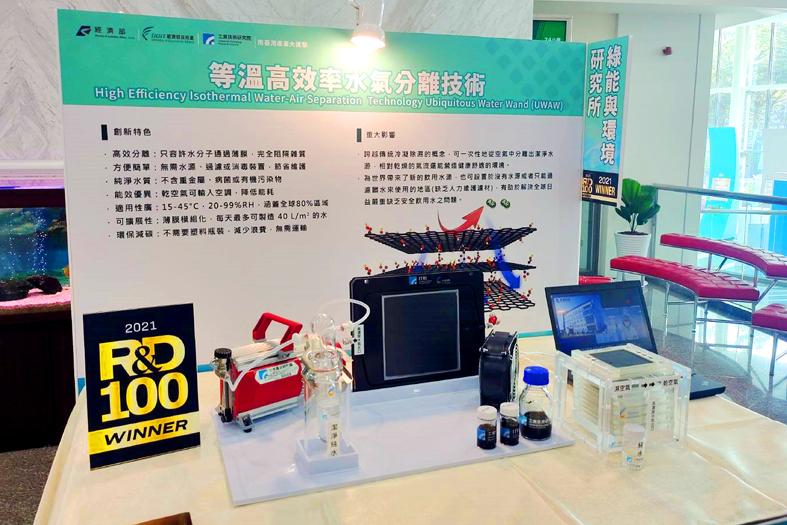The Industrial Technology Research Institute (ITRI) on Wednesday unveiled a graphite membrane-based technology that can draw water from the air.
The technology was recognized this year at the US-based R&D 100 Awards, the institute told a news conference at an innovation forum at its Southern Region Campus in Tainan’s Lioujia District (六甲).
The graphite oxide membrane is housed in a “ubiquitous water wand,” which collects water vapor from the air and condensed water from it, potentially helping people in arid climates, the institute said.

Photo: CNA
Scientists are exploring possibilities to make use of the material on a large scale, which could provide a technological response to water scarcity, it said.
Other inventions highlighted at the forum included a miniaturized 3D sensing module that enables robots to grab objects with precision and a kilowatt-class fuel cell technology that boosts the efficiency of hydrogen batteries, it said.
Institute senior vice president Wu Cheng-wen (吳誠文), who is director-general of the southern campus, said that the semi-public foundation is working with the government to upgrade industry in southern Taiwan.
The institute has collaborated with nearly 4,500 enterprises to integrate the technological research and innovation resources of the private sector, academia and the government, Wu said.
Tainan Deputy Mayor Chao Ching-hui (趙卿惠) said that the city has established complete industry value chains that are to be augmented by other projects, including the Shalun Green Energy Technology Demonstration Site and expansions to the Tainan Technology Industrial Park.
The ITRI is a valued partner in the city government’s efforts to promote economic growth via investments in technology and renewable energy, Chao said.

The Grand Hotel Taipei on Saturday confirmed that its information system had been illegally accessed and expressed its deepest apologies for the concern it has caused its customers, adding that the issue is being investigated by the Ministry of Justice Investigation Bureau. The hotel said that on Tuesday last week, it had discovered an external illegal intrusion into its information system. An initial digital forensic investigation confirmed that parts of the system had been accessed, it said, adding that the possibility that some customer data were stolen and leaked could not be ruled out. The actual scope and content of the affected data

‘LIKE-MINDED PARTNER’: Tako van Popta said it would be inappropriate to delay signing the deal with Taiwan because of China, adding he would promote the issue Canadian senators have stressed Taiwan’s importance for international trade and expressed enthusiasm for ensuring the Taiwan-Canada trade cooperation framework agreement is implemented this year. Representative to Canada Harry Tseng (曾厚仁) in an interview with the Central News Agency (CNA) said he was increasingly uneasy about Ottawa’s delays in signing the agreement, especially as Ottawa has warmed toward Beijing. There are “no negotiations left. Not only [is it] initialed, we have three versions of the text ready: English, French and Mandarin,” Tseng said. “That tells you how close we are to the final signature.” Tseng said that he hoped Canadian Prime Minister Mark Carney

POSITIVE DEVELOPMENT: Japan and the US are expected to hold in-depth discussions on Taiwan-related issues during the meeting next month, Japanese sources said The holding of a Japan-US leaders’ meeting ahead of US President Donald Trump’s visit to China is positive news for Taiwan, former Japan-Taiwan Exchange Association representative Hiroyasu Izumi said yesterday. After the Liberal Democratic Party’s landslide victory in Japan’s House of Representatives election, Japanese Prime Minister Sanae Takaichi is scheduled to visit the US next month, where she is to meet with Trump ahead of the US president’s planned visit to China from March 31 to April 2 for a meeting with Chinese President Xi Jinping (習近平). Japan and the US are expected to hold in-depth discussions on Taiwan-related issues during the

President William Lai (賴清德) yesterday bestowed one of Taiwan’s highest honors on Saint Vincent and the Grenadines (SVG) Ambassador Andrea Clare Bowman in recognition of her contributions to bilateral ties. “By conferring the Order of Brilliant Star with Grand Cordon on Ambassador Bowman today, I want to sincerely thank her, on behalf of the Taiwanese people, for her outstanding contribution to deepening diplomatic ties between Taiwan and SVG,” Lai said at a ceremony held at the Presidential Office in Taipei. He noted that Bowman became SVG’s first ambassador to Taiwan in 2019 and